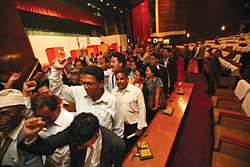 KIRAN PANDAY |
The reason is not that the CA is unable to write it in time. It is because we are stuck in a political quagmire of deep ideological divisions between the main political parties on issues like federalism. The UML and the Maoists want provinces based on ethnic, linguistic and geographical identity while the NC, RPP and others reject ethnic provinces.
There is also disagreement over state structure. Earlier they couldn't agree on having a presidential or parliamentary system but all wanted a pluralistic multi-party democracy. Now the Maoists want a 'unicameral people's assembly' and a standing committee within it, which will run the government. They also want the judiciary to come under the legislature, and there are differences over the electoral process.
These are not just procedural issues, there are now fundamental differences in the political value systems of the parties. Normally, post-conflict countries chart out their political future only after the demobilisation of fighters. Here, even the Maoist government did little to move the process of integration forward, raising suspicions that it wants to keep its army at least until the first elections under the new constitution.
However, the biggest weakness of the constitution-writing process has been that we sat down to write it without first laying down the basic principles. There was a constitution court, but all it did was oversee elections. So there is no ideological foundation to build the constitution on, and it has become an open-ended free-for-all. Suggestions were collected, but now they are arguing over every word.
A CA member that gheraos the rostrum is, a few minutes later, sitting down to lead a committee discussion. Committee drafts reflect the views of their chairs with the others registering pro forma dissent. A major flaw in the process was not separating the function and roles of the constituent assembly and parliament from the very beginning.
So, most party representatives want all or nothing. Constitution writing is not a zero-sum game. And there is now also a dangerous tilt to the right, with some arguing that it was a mistake to give away so much to the Maoists. There is a danger that these forces will use the excuse of a delayed constitution to come out into the streets.
The disagreements in the drafting committees all stem from the basic political differences between the parties over power sharing. Whenever the political leaders meet, it is to discuss who should be in power, not the constitution. In fact civil society organisations funded by donor agencies seem more preoccupied with the constitutional process than our political leadership. A sovereign nation cannot write a new constitution solely on the basis of outside support and money.
The Maoists are bogged down by internal rifts. They say one thing to their cadre, another thing at the Khula Manch and quite another thing to the international community. The other parties, by not giving space to the moderate line within the Maoists, are making them more aggressive.
Then, there are our southern and northern neighbours. Both India and China are following the identity-led constitution-writing process with some degree of alarm because of the effect this could have on their own domestic security concerns. The UN, on the other hand, doesn't want Nepal's peace process to be a failure just because our politicians can't get along. The UN may therefore lobby and even exert pressure, but there is no reason to get worked up about this.
Further delays in constitution writing will not only invite a dangerous political crisis, but also increase external interference. If we can finish the new constitution and set democratic institutions in place India's role, for one, will automatically be reduced.
So, what do we do? Four things:
1. Bring the politics back on track
2. Don't argue over form, but substance
3. Enforce the rule of law
4. Leave space for constitutional amendments
Clearly, the most urgent need is to set up a power-sharing coalition based on the proportionality of members in parliament. Then, agree on basic political principles of democracy and pluralism and leave the details for the committees to work out. After that the rest will fall into place.
Krishna Khanal is a professor of political science at Tribhuvan University.
READ ALSO:
Constitution 2010, Nepali Times coverage of issues related to writing the new constitution


